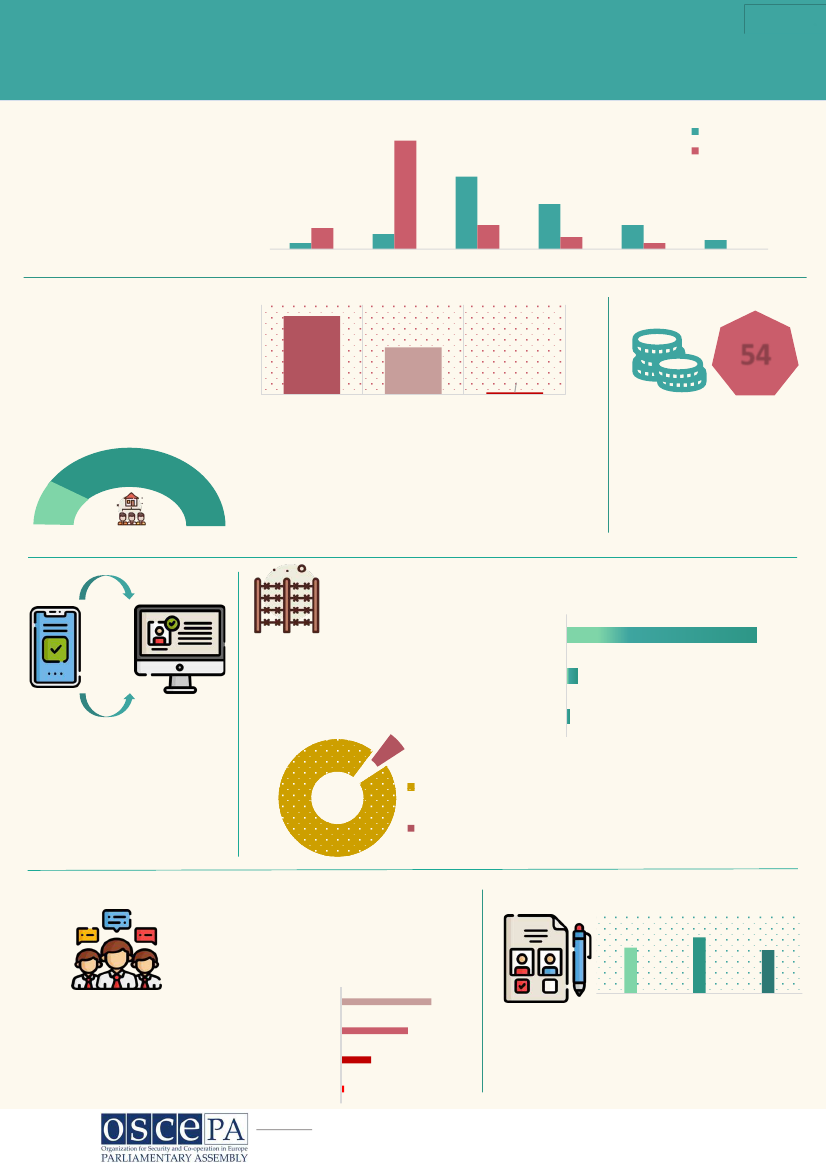
3 April 2020
COVID-19: Overview of the OSCE participating States’ response
The Organization for Security and Co-
operation in Europe’s (OSCE) region has
been severely hit by the COVID-19
pandemic. While 29 (51%) participating
States (pS) have reported less than 1,000
infections, 9 (16%) of them have now over
10,000 confirmed cases and 3 (5%) have
already breached the 100,000 infections
threshold. Mortality rates are also growing
throughout the region, with Italy and Spain
having suffered over 20,000 victims
collectively.
NR. pS
40
30
20
10
0
0
1 - 100
100 - 1,000
1,000 - 10, 000 10,000 - 100,000
INFECTION CASES
DEATH CASES
> 100,000
INFECTION/DEATH
RANGE
STATE OF EMERGENCY
Consequently, almost 2/3 (62%) of the OSCE
pS declared a “state of emergency”, or a
similar regime, to facilitate the swift
enactment of several countermeasures.
Some of them adopted it only on a regional
level.
ECONOMIC MEASURES
35
21
YES
NO
1
N/A
54
SOCIAL DISTANCING & PERSONAL CONFINEMENT
54
3
The vast majority of pS, 54
(95%)
adopted
measures
intended to introduce varying
degrees
of
personal
confinement. Only 3 (5%) pS
refrained from introducing such
measures so far.
54
OUT OF 57 pS PUT ON HOLD
PUBLIC SERVICES AND PRIVATE
BUSINESSES TO SOME EXTENT.
YES
NO
N/A
1
3
To
mitigate
the
economic
repercussions of the pandemic,
support measures have been adopted
by 54 pS (95%). Measures in this
category include labour and business
support in the form of obligations
relaxation, direct income support and
soft loans, as well as macroeconomic
measures such as cutting interest rates,
introducing
liquidity
packages,
suspension of bankruptcy proceedings.
INTERNATIONAL TRAVEL RESTRICTIONS & BORDER SHUTDOWNS
53
Out of 57 OSCE pS, 53 (93%) have imposed some level of
international travel restriction, while 3 (5%) have not
restricted travel from the beginning of the global Covid-
19 outbreak. Measures undertaken vary, including entry
and exit ban for foreign nationals, a mandatory
quarantine regime for travellers and other.
ELECTRONIC MONITORING
MEASURES
As of now, 12 out of 57 pS (or 21%) are
making use of some sort of electronic
monitoring tools to prevent/mitigate the
further spreading of the virus, as well as to
control enforcement of adopted social
distancing measures.
6
Yes
Land border shutdowns follow the general trend of international travel
bans. In the OSCE region, 51 pS (89%) have applied partial or complete
border shutdowns while 6 (19%) have not done so. Transiting of foreign
nationals (so-called “humanitarian corridors”) is usually permitted, while
transportation of essential goods is generally excluded from shutdown
measures.
51
No
IMPACT ON THE WORK OF PARLIAMENTS
In 27 pS (47%), essential emergency and/or
economic support measures have been
approved with the engagement of national
parliaments. Parliamentary consultation of
emergency texts are in the pipeline for 9 pS.
In 52 of out of 57 pS (or 91%),
parliamentary work has been affected by
the pandemic to a certain extent, with
most legislative bodies implementing
social distancing and teleworking
measures. Notably, in 4 pS (7%) the
parliaments are temporarily not
operating.
YES
NO
UNDER CONSIDERATION
N/A
IMPACT ON THE SCHEDULED ELECTIONS
18
22
17
N/A
27
20
9
1
YES
NO
Out of the 40 pS (100%) which have elections scheduled in 2020, 18
(45%) have already postponed, or cancelled, them due to the Covid-
19 outbreak. In 22 pS (55%) elections are still planned to take place
as originally scheduled. It should be noted that 17 pS have no
elections planned for 2020.
DISCLAIMER: This overview of the OSCE participating States' key responses to the COVID-19 pandemic has
been collated for informative and comparative purposes based on open sources data. As such, the OSCE PA
makes no claims nor warranties of any kind, express or implied, about its completeness and reliability.